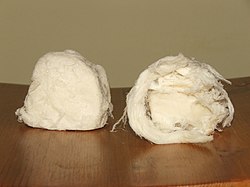food.wikisort.org - Dish
Pişmaniye (Bosnian: Ćetenija) is a Turkish and Bosnian sweet in fine strands made by blending flour roasted in butter into pulled sugar. It is sometimes garnished with ground pistachio nuts. Although it is sometimes compared to cotton candy, both the ingredients and method of preparation are significantly different.
 | |
| Alternative names | Tel helva, çekme helva, tel tel, tepme helva, keten helva, Ćetenija |
|---|---|
| Type | Dessert |
| Place of origin | Turkey |
| Region or state | Kocaeli, Turkey |
| Main ingredients | Flour, butter, pulled sugar |
Until recently pişmaniye used to be made at home in most regions of Turkey, but this tradition is now rapidly disappearing.[1] Today the manufacturing process is partially mechanised.[2]
Alternative names
There are many different Turkish names, used in different provinces, the most common being tel helva, çekme helva, tel tel, tepme helva and keten helva.
Origin and etymology
The earliest Turkish reference to pişmaniye is a recipe by Şirvani,[3] a physician writing during the 1430s. The Persian form pashmak, related to paşmīna and paşm, the origin of the Turkish name pişmaniye,[4] occurs in the poetry of the Iranian poet Ebu Ishak, also known as Bushak (d. 1423 or 1427).[5] "Pashm" in Persian means wool, and "Pashmak" means wool-like.
Another theory is that it may be of a Coptic origin from :'ⲡⲏⲥ: pis":[6] which means :" to mix flour with fat" , and "ⲛⲏⲓⲛⲓ: nani or mani ":[7] which means : "honey" , this candy found in Egypt, known as "halawat sha'ar حلاوة شعر" which means : "hair candy".
See also
- Sutarfeni
- Soan papdi, a similar Indian sweet
- Pashmak
- Dragon's beard candy
References
- Üçer, Müjgan (1992). Sivas Halk Mutfağı. Sivas, 71-72
- Yıldırım, Renan, "Ağızda Dağılan Lezzet Pişmaniye", Skylife, February 2003
- Şirvani, Muhammed bin Mahmud, 15. Yüzyıl Osmanlı Mutfağı, eds. Mustafa Argunşah and Müjgan Çakır, Istanbul:Gökkubbe Yayınları, 2005, 126-127; Priscilla Mary Işın, Gülbeşeker, Türk Tatlıları Tarihi, İstanbul:Yapı Kredi Yayınları, 2008, 191-192
- "Nişanyan Sözlük - pişmaniye" [Nişanyan Dictionary - pişmaniye]. Nişanyan Sözlük (in Turkish). Retrieved 22 September 2018.
- Ahmed Cavid, Tercüme-i Kenzü'l-İştiha, eds. Seyit Ali Kahraman, Priscilla Mary Işın, İstanbul:Kitap Yayınevi, 2006, 22, 98
- Moawad Dawood Coptic dictionary , P:293b
- Moawad Dawood Coptic dictionary , P:206a
External links
- Video of traditional hand-made technique filmed in a bazaar
- Demonstration of modern mechanized equipment in the making of pişmaniye
На других языках
- [en] Pişmaniye
[ru] Пишмание
Пишмание (пашмак, «борода дракона», лёгкая халва) — сладость турецкой кухни, представляющая собой клубки из тонких нитей, состоящих из обжаренных в масле муки и сахара, иногда с добавлением фисташковых орехов, кунжута, ванили или других вкусовых добавок. Может быть описана как нечто среднее между халвой и сахарной ватой. Зрительно напоминает скрученный моток ниток, вкус очень приторный.Другой контент может иметь иную лицензию. Перед использованием материалов сайта WikiSort.org внимательно изучите правила лицензирования конкретных элементов наполнения сайта.
WikiSort.org - проект по пересортировке и дополнению контента Википедии